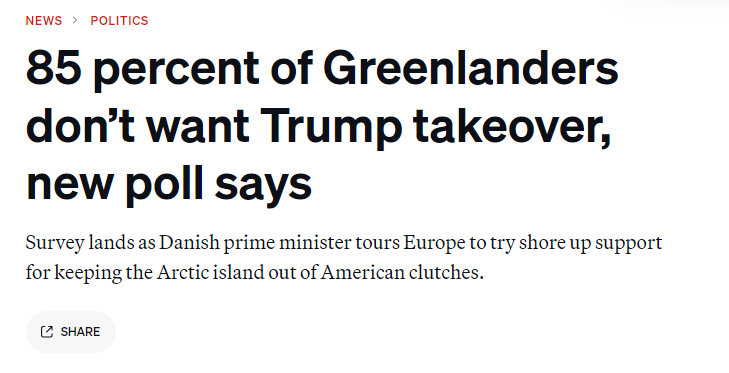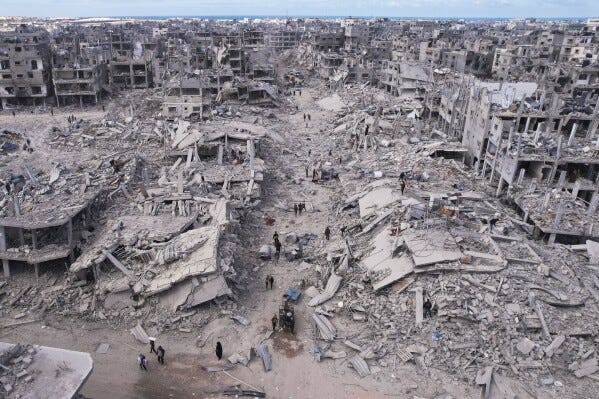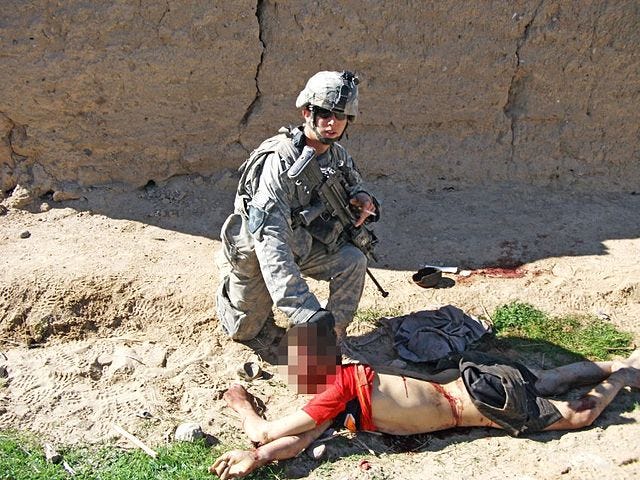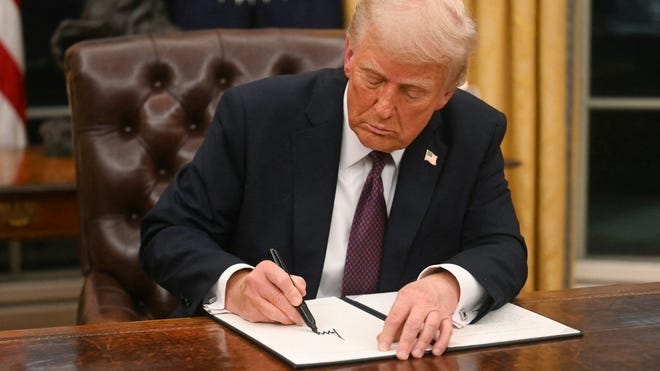NATO is in shambles.
disunity on all fronts and a rising Emperor in the West have left the Alliance looking a bit shabby.
Good day, spectators,
And I hadn’t really thought about this for a while—at least, not in any real depth—until I saw Germany’s Olaf Scholz blocking yet another massive aid package to Ukraine. It got me thinking: NATO isn’t doing particularly well, is it?
There’s been an assumption, a kind of unspoken belief, that despite all of its flaws, NATO is still the most powerful military alliance on the planet. That it’s functional. But lately, the cracks have become more apparent.
From my perspective, the alliance looks fractured on almost every issue—Ukraine, Palestine, Russia, China, internal EU disputes, even basic questions about its future. More and more, it’s clear that NATO isn’t a united force but a disjointed collection of states, some still willing to play America’s game, others quietly stepping out of line.
And now, to make things even more absurd, the United States—NATO’s de facto leader—is run by a man who once tried to buy Greenland and now might very well try to just take it by force. Trump’s return to power is a wildcard, and his vision of the world has little to no room for NATO.
the seeds of disunity.
NATO's current disarray didn't happen overnight. The seeds of chaos were planted long before Trump started barking about Greenland or before Germany hesitated over Ukraine aid.
If you want to pinpoint the start of NATO’s cracks, you could go back to Afghanistan, or even further—to Iraq. The United States, drunk on post-9/11 war fever, dragged NATO allies into the Middle East under the guise of ‘defending democracy.’ What followed was decades of bloodshed, the deaths of hundreds of thousands of civilians, and an alliance forced to toe the line of American imperial ambition. Some nations—like the UK—dutifully played the role of sidekick. Others—like France and Germany—begrudgingly followed, but not without internal divisions. The result? A growing sense that NATO wasn’t so much an alliance as it was a collection of states being strong-armed into serving Washington’s interests.
Then came the internet. In the early years, mainstream media still controlled the narrative. News websites were just digital mirrors of television reports. But slowly, alternative media and independent journalists started pulling back the curtain on NATO’s failures—the illegal invasion of Iraq, the lies about WMDs, the war crimes in Afghanistan. Public trust in NATO’s grand ‘defensive alliance’ image began to erode.
By the time Russia took control of Crimea in 2014, the fractures were already there. Some NATO members were chomping at the bit for confrontation. Others, particularly those reliant on Russian energy, were reluctant to escalate. The old Cold War unity—where the alliance had a clear enemy and a clear purpose—began to evaporate.
And now, nearly a decade later, those fractures have deepened into full-blown fault lines.
it’s simply not unified.
NATO’s unity is starting to look more like a polite bit of fiction than a functional reality. Absolutely nowhere is this clearer than in Ukraine. Once the alliance’s flagship cause, it’s clear to see support is beginning to wane as the war drags on. The United States has delayed military aid and Trump has begun the process of chatting to Putin to deescalate, Germany has blocked a multi-billion euro package, and across Europe, there is growing fatigue with pouring money into a war that increasingly looks unwinnable. This is happening alongside a broader economic crisis that makes it harder to justify endless military spending when domestic problems are piling up.
Then there’s Palestine, where NATO’s moral contradictions are on full display. The same alliance that rallied behind Ukraine in the name of ‘international law’ is now split between those defending Israel’s genocide and those openly calling it out. Spain and Norway have taken a hard stance against Israel, while the US, UK, and Germany continue to back it unconditionally. The result is another layer of internal friction—because how can NATO claim to uphold ‘rules-based order’ when its members can’t even agree on what that means?
Meanwhile, Hungary and Slovakia are drifting further from NATO’s mainstream position, especially when it comes to Russia. Viktor Orbán has made a sport of obstructing NATO decisions, from blocking EU military aid to Ukraine to delaying Sweden’s accession. Slovakia’s Robert Fico, having returned to power, is taking a similarly pro-Russian stance. While some of this is political theatre, energy dependence plays a crucial role—both countries still rely on Russian gas, making the West’s sanctions push feel more like an inconvenience than an obligation.
And then of course there’s Türkiye. President Erdoğan, prudent as always, is playing both sides. In name, Türkiye is of course a NATO member, but it is consistently slow-walking the alliance’s priorities. Sweden’s NATO membership was held up for months as Erdoğan milked concessions to his heart’s desire, while Türkiye’s economic ties with Russia remain intact despite Western sanctions. At the same time, Türkiye’s ongoing military operations in northern Syria put it directly at odds with the US, which has backed the Kurdish groups that Ankara considers terrorists. If NATO were truly a unified force, Erdoğan wouldn’t be able to get away with this, but the fact that he can—and does—only highlights how unserious it all is.
What all of this shows us is that NATO isn’t just dealing with minor spats. It’s dealing with fundamental fractures—on strategy, on morality, and on what it even means to be an alliance in the first place. Ultimately, the problem is that these countries are greedy and selfish and as soon as something doesn't align with their goals they will simply ignore responsibilities.
Greenland, Greenland, Greenland.
At first, the idea of the United States trying to take Greenland sounded like the ramblings of a geriatric old man. When Donald Trump first floated this idea in 2019, most of the world laughed it off as one of his bizarre outbursts. But as he rockets back into power, signing extreme executive orders such as ‘the largest deportations in history’ and fulfilling his most contentious campaign promises like never before, it’s no longer a joke and looks like a serious possibility.
The silence from NATO and the EU on the issue is...something.
If Trump were to push forward with an actual attempt to acquire Greenland—what exactly would NATO do? The honest answer is probably nothing. The United States is the backbone of NATO and if it decides to rewrite the rules of international sovereignty, the alliance would likely just break. I can’t imagine the US would stay part of the organisation in this case anyway.
Denmark, which officially controls Greenland, is rightfully freaking out—in a hilariously ironic turn, I must add. The country has long resisted European military integration, famously rejecting Macron’s push for an EU army, largely to stay in line with US interests. But now, it finds itself in the awkward position of relying on the very alliance it worked to keep at arm’s length—all just to appease the US, which has now become its greatest threat.
I promise you, readers, with material like this, it is a great time to be in the business of roasting the West.
And while NATO’s leadership remains completely silent, Russia is watching with glee. China, too, is enjoying the spectacle, not because it wants Greenland, but because it knows that every moment the West wastes on internal fractures is a moment Beijing can use to surge ahead. The silence from NATO and the EU isn’t just dithering—it’s appeasement. By refusing to even acknowledge the situation, they are effectively conceding that if Trump pushes forward with his Greenland ambitions, they won’t lift a finger to stop him. And I just want to use this moment to be explicitly clear that the Greenlanders have voted overwhelmingly against the idea of being taken over by the US. Just yesterday, a survey came out saying 85% were against:

NATO was designed to counter external threats, not deal with the chaos of its own members. And if the alliance can’t even muster a statement when its most powerful member flirts with the idea of annexing part of another, what exactly is it capable of? Greenland might seem like a sideshow at first glance, and it kind of is, but it’s a microcosm of a much bigger problem. This is a broader mirror of the entire Western order and it is showing us its age—and fragility.
a new order?
So for me, the question is not whether NATO could still function as the most powerful military alliance in the world because obviously it could. The question is whether it would. Considering all of the things that we have discussed in this article so far, I'm just not sure that every member would be motivated to get involved in any war.
The last time the US rallied the NATO troops, after 9/11, a lot of allies participated but with a clear reluctance. They limited their involvement to defensive roles rather than taking part in US-led offensive operations. If the United States were to call on NATO today, over an incident in Ukraine, the South China Sea, or even Greenland, the response would likely be…flaccid. I estimate many NATO countries are no longer willing to be used as foot soldiers for Washington’s wars, and with economic crises mounting at home, the appetite for endless military spending is fading fast. Who the hell wants to go to war when you’re struggling to pay your rent? And this is the reality of many countries in NATO. Just one month ago I read that European countries’ support for Ukraine is dropping drastically and that is no surprise:

So where does that leave us? NATO, in its current form, probably won’t last. With the rise of anti-NATO Trump, a slow disintegration seems inevitable, with the alliance either changing into a looser collective or even breaking into competing factions. I am going to throw out some quite theoretical ideas here so bear with me and save comments for below.
The most likely outcome I am seeing right now is a world where three distinct spheres of influence emerge:
A North American empire – Trump’s vision of an America-first world doesn’t include NATO as we know it. If he pushes for US dominance over Greenland and an increasingly isolated foreign policy, the natural result is a bloc consisting of the US, Canada and whatever territories the US decides to absorb into its growing ambitions. The UK, the ever eager sycophant and ‘specially related’ ally, would likely follow.
A fractured Europe – With the US increasingly unreliable as a security guarantor, Europe will be forced to either develop its own independent military force or resign itself to further fragmentation. Macron has already floated the idea of an EU army, and if NATO weakens, this idea may be resuscitated. But European disunity—on everything from Russia to Palestine to defence spending—makes this easier said than done.
Russia and China playing the long game – While NATO crumbles under its own contradictions, Russia and China don’t need to do much beyond sit back and laugh. Russia will continue its steady gains in Ukraine until the end, while China, despite Western hysteria, will stay focused on what it’s been doing for decades: looking inwards, developing its economy, and overtaking the US in key technological and infrastructure sectors.
NATO is very much at risk of becoming obsolete. And if that happens, the Western-led global order, built on the back of this alliance, may simply collapse right alongside it. And that's not the worst thing considering what we've witnessed just in the past year:

A once-seemingly unbreakable alliance that could dictate global affairs with ease is now showing itself to be a bit silly if not downright nefarious, and as the wounds deepen, it’s becoming clear that we could be witnessing the slow-motion collapse of an organisation that no longer even knows what it stands for.
A military alliance that flip flops on Ukraine, can’t agree on Palestine, and remains completely silent as its largest member flirts with annexing Greenland is an alliance in serious trouble. And the biggest threat to NATO isn’t Russia, or China—it’s NATO itself.
The question isn’t whether it can still function. It’s whether, when the next crisis comes knocking, likely from an unexpected place, it will even matter.
And on that thought, I will let you go. Please let me know where you think NATO is headed in the comments below, I love the discussion,
(As always, thanks for reading and please give this post a ❤️ and restack below.)
the spectacle is only possible because of its committed subscribers. I tackle the geopolitical stories mainstream news channels ignore, distort or simply lie about. Help keep it going and supporting independent journalism by becoming a paid subscriber to get full access to the magazine. Alternatively, buy me a sandwich for 3 euro below!
If everyone reading this note made a small contribution, I could dedicate myself to this work full time, bringing you even more unfiltered, independent journalism. Every contribution counts and is deeply appreciated. Thank you for being part of this community.
Read more from the spectacle…















Good article which clearly articulates the contradictions weakening NATO. I agree with the idea of the US and EU drifting apart. Conservatives here in Canada, like their counterparts in Great Britain, have always envisioned the silly idea of an Atlantic alliance based on the English speaking countries of US, Canada and UK excluding the rest of Europe and the Americas. As I understand this was one of the main visions of Brexit. As the US empire retracts I can see this idea getting more traction. However with Trump trying to beat Canada into submission this may put that plan in jeopardy. Personally I would hope the next Prime Minister here will maintain and maybe increase ties with Europe, and establish ties with countries like Mexico and Brazil which now have very impressive leaders. Some astute commentators have remarked that throughout his business and political careers Trump has many times mistakenly believed he has leverage when doesn’t,
As the kids say, nato is 'cooked'
Just read this on the train back home, thank you for the long read declan